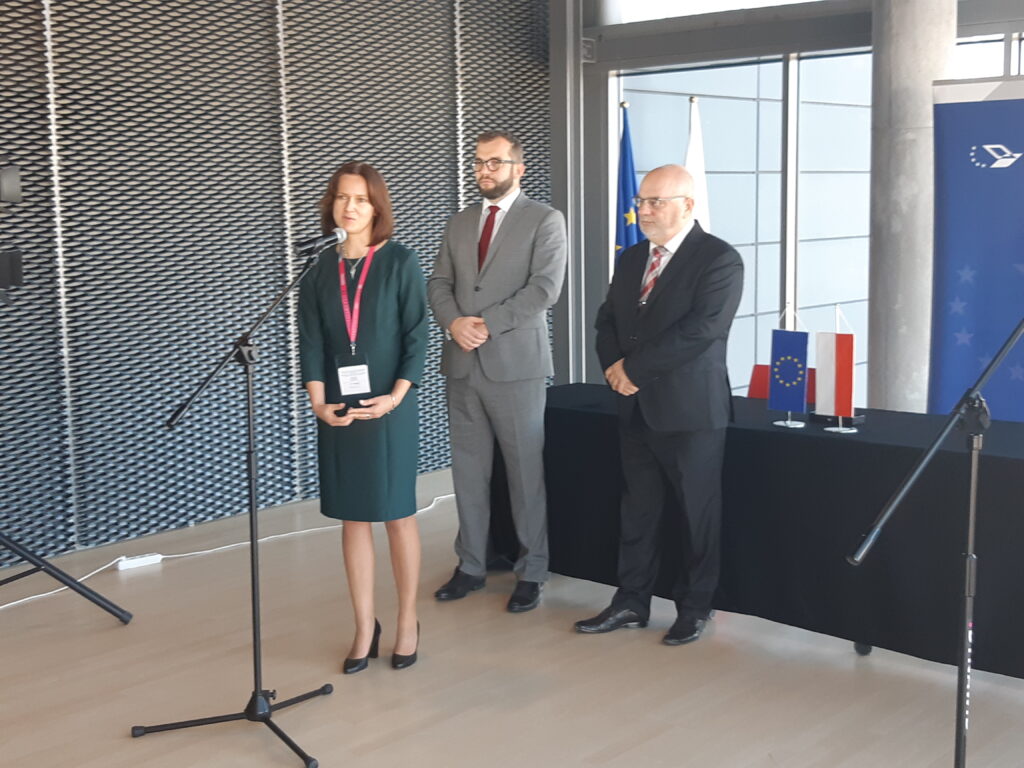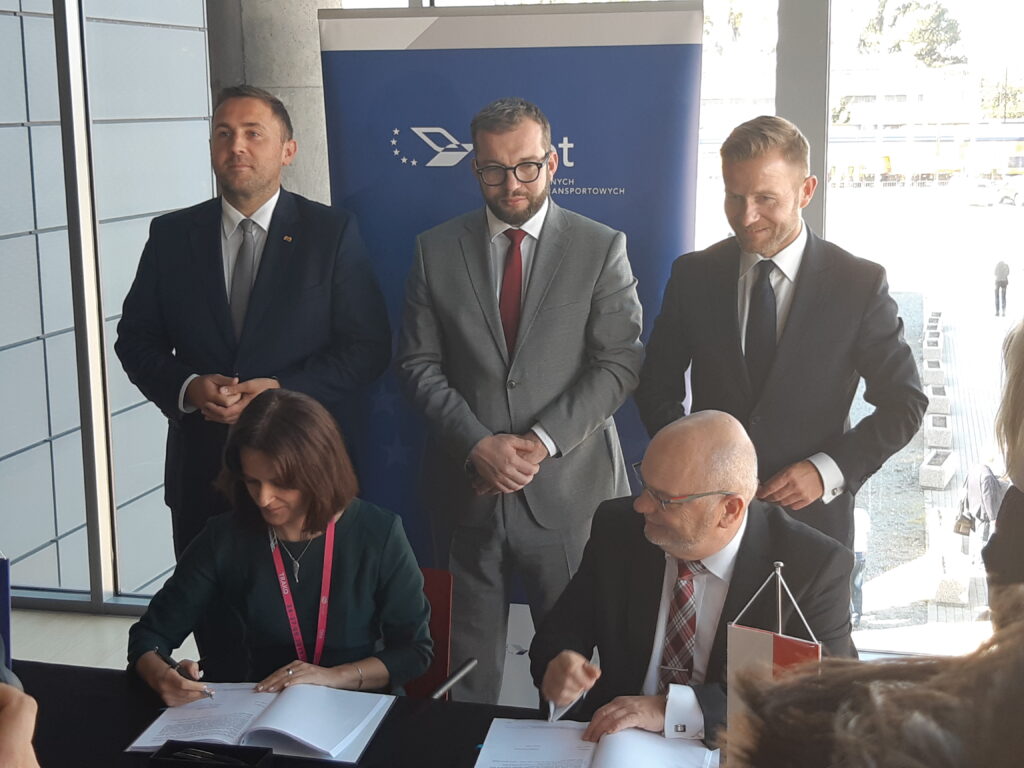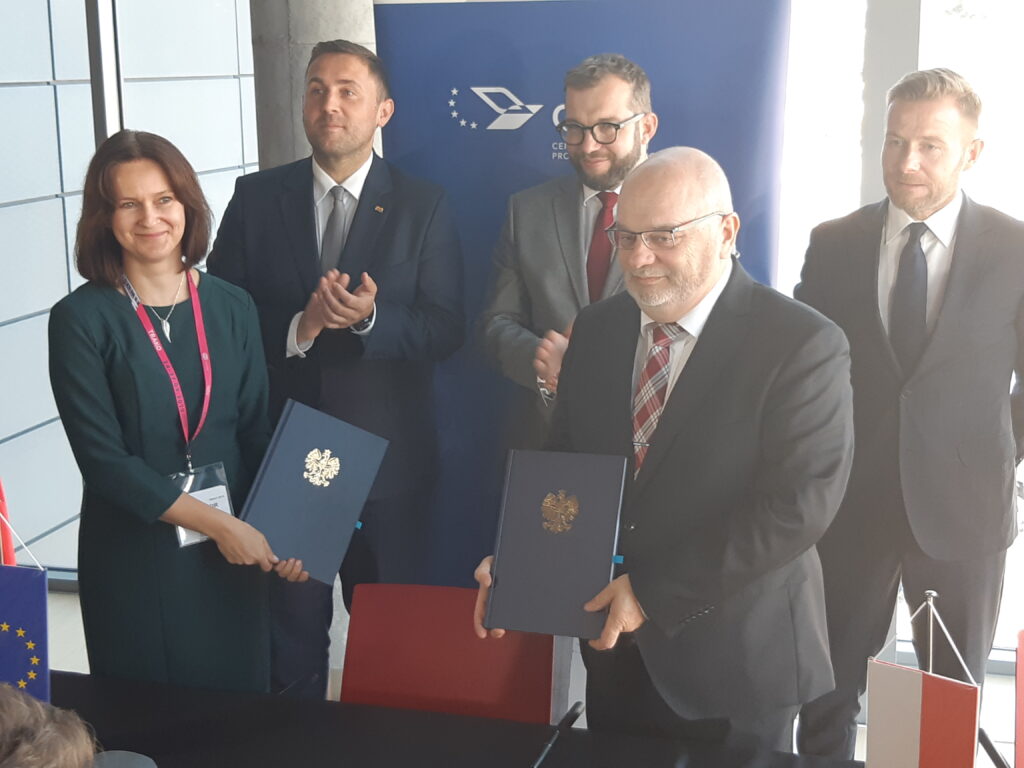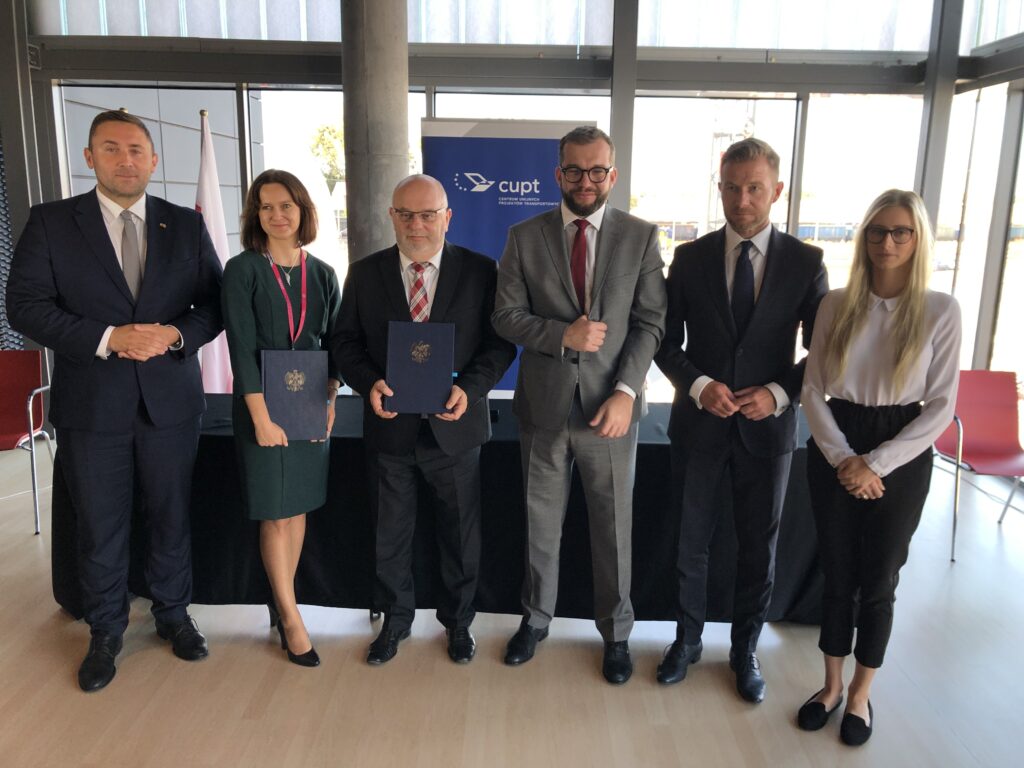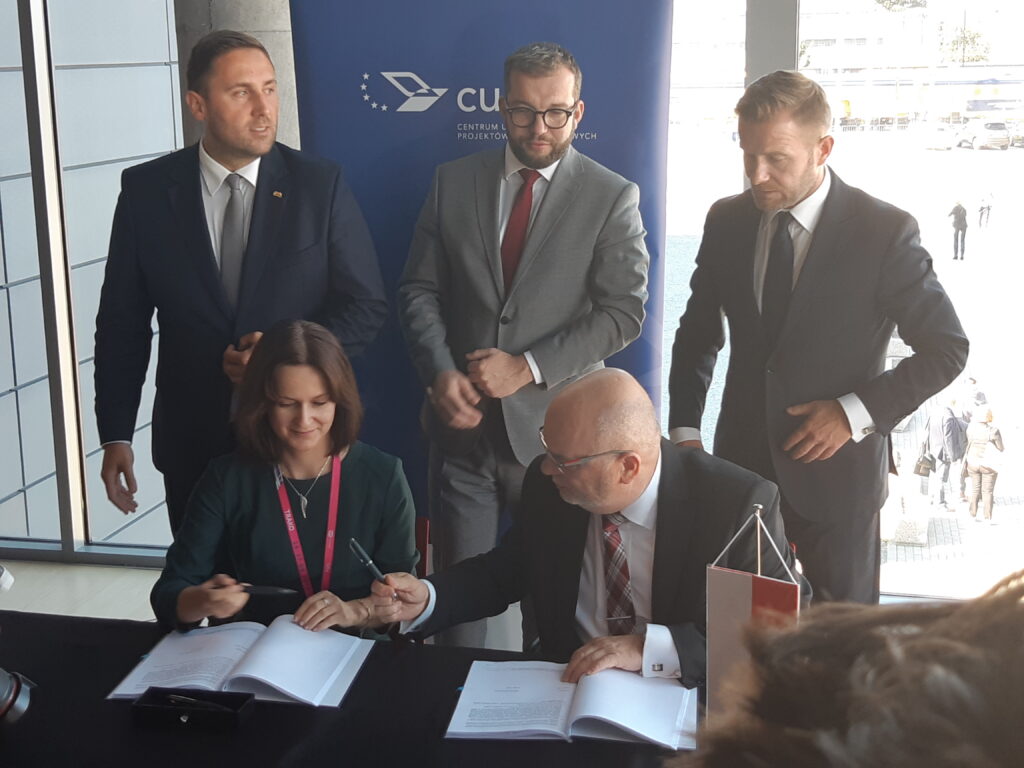
Ceremonial signing of the agreement
for co-financing an integrated ticket for Pomerania
During Trako, which is one of the most important events in the transport industry in Poland, a contract for co-financing the integrated ticketing project for Pomerania was signed. We are talking about the amount of PLN 90 million, which the EU Transport Projects Centre granted to the company InnoBaltica for the implementation of the project called: "Increasing the accessibility of regional rail transport in the Pomeranian Voivodeship through its integration with local transport - building an electronic Platform of Integrated Mobility Services".
The agreement was signed by Joanna Lech, acting Director of the Centre for EU Transport Projects, and Krzysztof Rudziński, President of InnoBaltica.
Grzegorz Puda, Secretary of State at the Ministry of Investment and Development, emphasised during the ceremony the innovativeness of the project, for which the EU funding was directed.
- In fact, we have to trust the beneficiary and believe that this innovative project will succeed as described, he said.
- The system, which we will implement in Pomeranian Voivodeship, is a revolution in the way self-governments think about ticket integration - said Krzysztof Rudziński, the president of InnoBaltica. - After many months of agreements and negotiations we managed to find such a solution, which allows to gather on one electronic platform the rules of functioning of public transport of ten biggest self-governments of our region. None of the transport organisers will lose their autonomy, and at the same time, thanks to electronic integration, they will function as a single organism. The essence of the platform for integrated mobility services is that we will give passengers a highly advanced tool for simple and intuitive use of public transport in the entire Pomeranian region.
Podpisanie umowy spowoduje uruchomienie środków unijnych, dzięki którym województwo pomorskie będzie miało jeden z najbardziej nowoczesnych zintegrowanych systemów płacenia za przejazdy w transporcie publicznym. – To dobry moment dla transportu publicznego na Pomorzu. Mamy rekordową liczbę pasażerów, a mieszkańcy regionu bardzo chętnie korzystają z kolei. Te osiągnięcia wymagają jednak innowacyjnych rozwiązań, takich jak Platforma Zintegrowanych Usług Mobilności – mówił Ryszard Świlski, wicemarszałek województwa pomorskiego. Dzięki tym pieniądzom na Pomorzu powstanie wysoko zaawansowany technologinie system, który umożliwi wspólną podróż pasażerom, niezależnie od środka transportu czy operatora. Dziś tak naprawdę robimy pierwszy krok ku nowemu systemowi.
What exactly is this money to be used for?
First of all, to create a highly technologically advanced system that will enable joint travel for passengers in the Pomorskie Voivodeship without the knowledge of tariffs and carriers. The system will include passenger accounts, information on ticket prices, bus, tram, trolleybus and train routes and timetables.
The mechanism will include a billing application, allowing for settlement of a passenger's travel expenses for a given route on the basis of identification in various means of transport. An important element of the project will also be a mobile application, enabling route planning and full settlement of the costs of travel by different means of transport.
Co-financing from POIiŚ is to cover the cost not only of the system, but also the purchase of validating devices installed at train stops in Pomorskie Voivodeship and at selected stations of neighbouring voivodeships, in local transport vehicles of the Tricity agglomeration as well as in Lębork, Malbork, Słupsk, Tczew, Wejherowo, Starogard Gdański and Chojnice, issuance of 300 thousand cards (NFC identification carriers), organisation of about 30 customer service points as well as conducting an educational and information campaign throughout the voivodeship.
Basic assumptions
The system will enable the passenger to pay for travel without the need to know the ticket prices (tariffs) valid on specific routes and in specific cities. This means that when getting on and off the vehicle, the passenger will only have to signal his/her entry into the vehicle on a special validator (cash register). The electronic tool will determine which vehicle it is, which carrier it belongs to, how long the journey took and what fare should be charged. The overriding functional features of the system are to be: ease of use, intuitive, reliable and precise billing.
InnoBaltica, a company owned by the Pomeranian Voivodeship, Gdansk and Gdynia, as well as three universities, is responsible for implementing the project: University of Gdansk, Gdansk University of Technology and Gdansk Medical University.
New elements in the public space
The basic elements that both passengers and carriers will have to deal with on a daily basis will be the terminal equipment (e.g. validators) and the passenger identification media. Validators are new elements that will appear in the public space. They will be devices installed in vehicles (buses, trams and trolleybuses) and at train stops throughout the Pomeranian Voivodeship. Passengers will use one of four identification media to bounce. They will have a choice between a smartphone app, a dedicated card, a credit card and a ticket with a QR code. Although a large part of the operation of the payment system will be transferred to electronic systems, passengers will be assisted by Customer Service Points, which will be located in the largest transport hubs. At these points, each passenger will be able both to buy a single ticket with a QR code and obtain a reusable ID. Point staff will assist in creating an account and activating the application or card.
Benefits not only for passengers. It is worth mentioning here the main benefits for the main stakeholders in public transport.
Passengers
The main benefit for this group will be the ability to travel freely on the vehicles of various transport operators without the need to know the ticket prices and without holding cash. The passenger will not waste time looking for a ticket office or point of sale, because all the formalities related to payment for travel will be handled electronically. The system will not only be able to calculate and collect the appropriate amounts, but also - under certain conditions - to optimise the fare according to the passenger's entitlement, thus making the journey cheaper in many cases.
The journey planner is a tool which, in cooperation with the billing system, will allow passengers to plan their journey in various variants, e.g. taking into account optimisation of distance, price or time. An important element of the journey planner will be facilities for persons with disabilities (e.g. a possibility of checking, without leaving home, which course is served by a low-floor vehicle and how it is connected with other courses of this standard). On-line passenger information, updated on a regular basis, will also be available. All this will contribute to the simplification of using transport services and will make public transport much more passenger-friendly than it is now.
Organizatorzy transportu Jedną z podstawowych korzyści dla organizatorów transportu będzie precyzyjne i automatyczne rozliczanie wpływów z biletów. Zakłada się także wzrost efektywności ekonomicznej dopłat do regionalnego transportu oraz zautomatyzowanie i uszczelnienie systemu rozliczania dopłat dla operatorów przewozów z tytułu honorowania ulg ustawowych. Ma to służyć podniesieniu rentowności oraz efektywności oferty komunikacyjnej przy jednoczesnym zachowaniu autonomicznych taryf poszczególnych organizatorów. Równocześnie system umożliwi organizatorom i operatorom pozyskiwanie danych statystycznych dotyczących przewozów, co z kolei powinno przełożyć się na optymalizację układu tras komunikacyjnych województwa pomorskiego.
Thanks to the integration of data, it will be possible to synchronise timetables at major transport hubs. The data collected by the system will also be used to introduce tariff solutions to reduce road congestion in some areas of Pomerania, as well as for strategic transport planning.
The name was chosen by the inhabitants
The new system of paying for tickets will be called FALA. This decision was made by the inhabitants of Pomerania, because the name was selected in a competition from more than three thousand submitted proposals. It is worth emphasising at this point that the councils of the largest cities in Pomeranian voivodeship have already adopted resolutions declaring accession to a common fare collection system, as well as resolutions reserving funds (as part of long-term financial forecasts) for maintenance of the system.
Not only POIiŚ
InnoBaltica is also co-financing this objective from other sources. As part of the Interconnect project (South Baltic Interreg programme), it is working with Germany, Denmark, Lithuania, Estonia and Sweden to develop a model for paying for public transport journeys that will enable tourists and business people from all of these countries to use public transport across borders without problems. Work in this area has already yielded PLN 6.7 million and pilot work is currently underway to implement technical solutions in this area.
InnoBaltica has also received funding from the ELENA financial instrument of nearly PLN 10 million for technical assistance in the development and implementation of the system.
